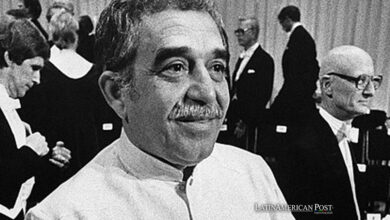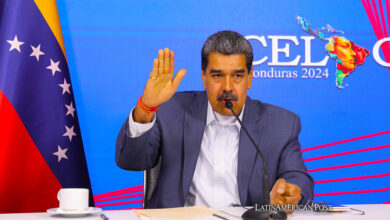What 2022 Left Behind: These are the 10 Latin American Books of the Year
To Continue with our Rankings and Say Goodbye to 2022 Properly, we Bring you our List of the 10 Latin American Books of the Year

Photos: Amazon, Planet of Books
LatinAmerican Post | July Vanesa López Romero
Escucha este artículo
Leer en español: Lo que dejó el 2022: Estos son los 10 libros latinoamericanos del año
Latin American literature has always had a special place in global culture, and this year was not far behind. Here we present 10 books written by Latin American authors that you cannot not read in 2023.
“Ustedes brillan en lo oscuro” by Liliana Colanazi (Bolivia)
Liliana Colanazi has a long history in literature, she is perhaps the most recognized contemporary Bolivian author today. With her book of stories “Ustedes brillan en lo oscuro”, she was the winner of the VII Ribera del Duero Award.
In this, Colanazi masterfully explores the narration of time, all starting from the radiological accident in Goiânia in 1987, which is connected to a phenomenon in an Andean nuclear power plant and in a town in the Brazilian Amazon. One of the most remarkable characteristics of this book resides in the author's narration, which manages to delve into the sensory.
“Donde no hago pie” by Belen López Peiró (Argentina)
"Donde no hago pie" by the Argentine author Belén López Peiró, is a chronicle that delves into the events narrated in her 2018 book “Por qué volvías cada verano”, which talks about the sexual abuse of which she was a victim in her childhood.
In this text, López Peiró takes us through the difficult path that victims of sexual abuse have to go through, in which they are constantly revictimized, where their voices are silenced and where even the word "family" loses all meaning. The work has been acclaimed for its ability to portray so assertively an injustice that millions of women must face every day.
“El tercer paraíso” by Cristián Alarcón Casanova (Chile)
The debut feature by Chilean author Cristián Alarcón Casanova was the winner of the important 2022 Alfaguara Novel Prize. His book praises the natural landscape of the Southern Cone from a protagonist who recalls a whole family history and explores human connections as part of the whole.
Alarcón Casanova tells us about the arrival of a man in Buenos Aires at the beginning of 2020, shortly before the confinement due to the pandemic began. The protagonist cultivates a garden while coping with his new reality and discovers, through his love for nature, scientific thought. The narrator plays with narrative threads, fictional levels, and literary genres to create the garden/paradise that this novel is.
“Redonda y Radical” by Tatiana de la Tierra (Colombia)
In this poetic anthology, the Sincronía publishing house includes the work of the late Tatiana de la Tierra, a Colombian poet living in the United States who dared to originate a entire poetics of feminist lesbianism in its most corporal and radical expression. Here we do not see hidden lesbians who embody the beautiful and perfect woman, but we see naked, fat, hairy bodies and their strength and beauty worthy of admiration.
This book rescues the work of an undervalued poet who has toured university lesbian circles so that her name becomes bigger, and her memory stays alive.
“Todas las bicicletas que tuve”by Powerpaola (Ecuador)
The new graphic novel by the Ecuadorian Powerpaola uses the bicycle as an always opportune means of transportation to go through different chapters of her life and string together the facts.
In this publication, which alludes to nostalgia, the visual artist and author narrates herself again and explores her bicycles as an extension of her own being, that which is at all times, in all places, and that He lets her walk the streets of the cities from which she is a migrant.
Read also: Review of "The White Lotus": the comedy of privilege
“Huaco retrato” by Gabriela Wiener (Peru)
With this, her first fiction book, the journalist Gabriela Weiner deconstructs and rebuilds the echoes of the conquest and the colony. This postcolonialism work uses a huaco retrato, which is a pre-Hispanic ceramic piece that represented indigenous faces, as a source to explore his history, that of his family and that of his ancestors and, in that order of ideas, to put on the table, the same Latin American story.
With this work, Weiner invites the reader to discover his own history, analyze it and question it.
“Sembré nísperos en la tumba de mi padre” by Johana Barraza Tafur (Colombia)
Himpar editores published this year the book of poetry by Johana Barraza Tafur in which she writes to her late father and to the Caribbean that she has left behind. Barraza Tafur is from Barranquilla, but lives in Buenos Aires. Here, the poet makes use of the nostalgia for the place where one grows up to foreground the pain left by the war that takes with it those who are most loved.
“Soy una tonta por quererte” by Camila Sosa Villada (Argentina)
Camila Sosa Villada has shown in recent years that she is one of the best and most important authors today. Her work is as varied as her trades, she has been a street vendor, a prostitute, an actress, a singer, and now she is a writer who sells thousands of copies annually.
With this book, Sosa Villada once again demonstrates her versatility with 9 stories starring characters who are marginal and extravagant in everyday life, but who in Sosa Villada's literary universe are daily bread.
“El Tlacuache” by Emmanuel Peña (Mexico)
This graphic novel, winner of the I Aristas Graphic Novel Award, plays with visual planes to highlight a protagonist who does not belong to his context and who struggles to face job insecurity.
This is the story of an actor who, faced with the necessities of life, becomes an insurance salesman and uses his acting skills to succeed in his new job. At first everything seems to work perfectly, but little by little the problems appear.
"Austral" by Carlos Fonseca (Costa Rica)
This novel is made up of four stories that seem to be alien, but are intertwined in their own composition. An author with aphasia struggling to finish her book; one last indigenous speaker who sees his culture fade away; a survivor of the Guatemalan genocide who remembers to overcome the traumas of war and a narrator who collects the stories one by one.
Fonseca shows in this novel his concerns, such as cultural loss, globalization and the environmental crisis.





